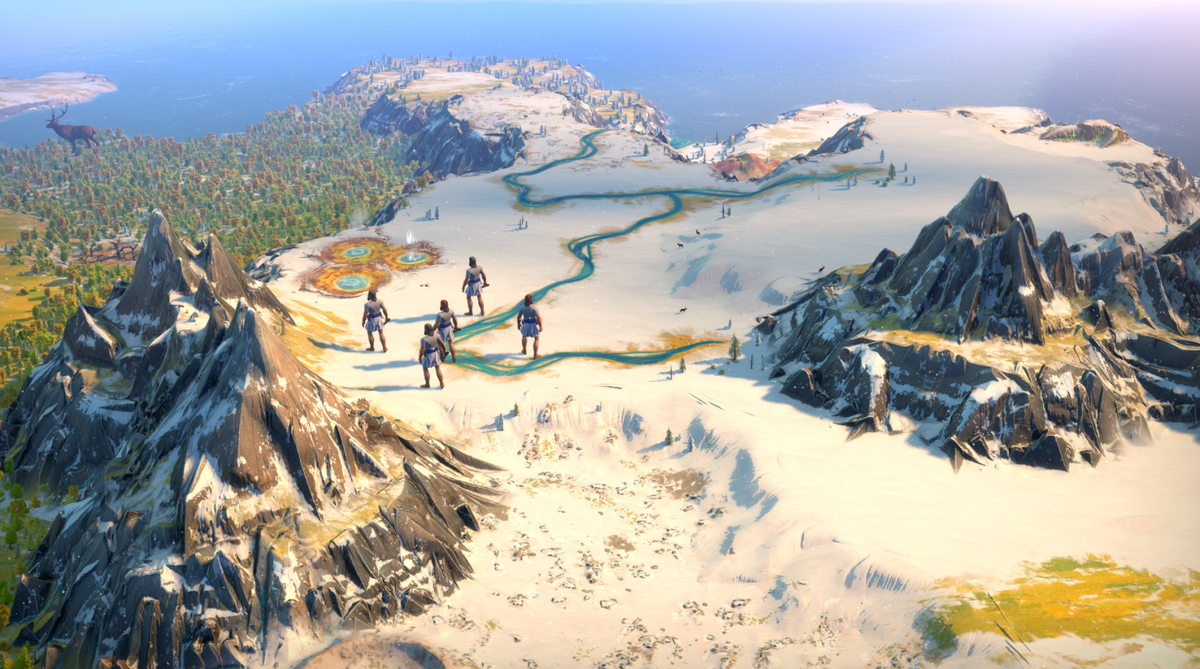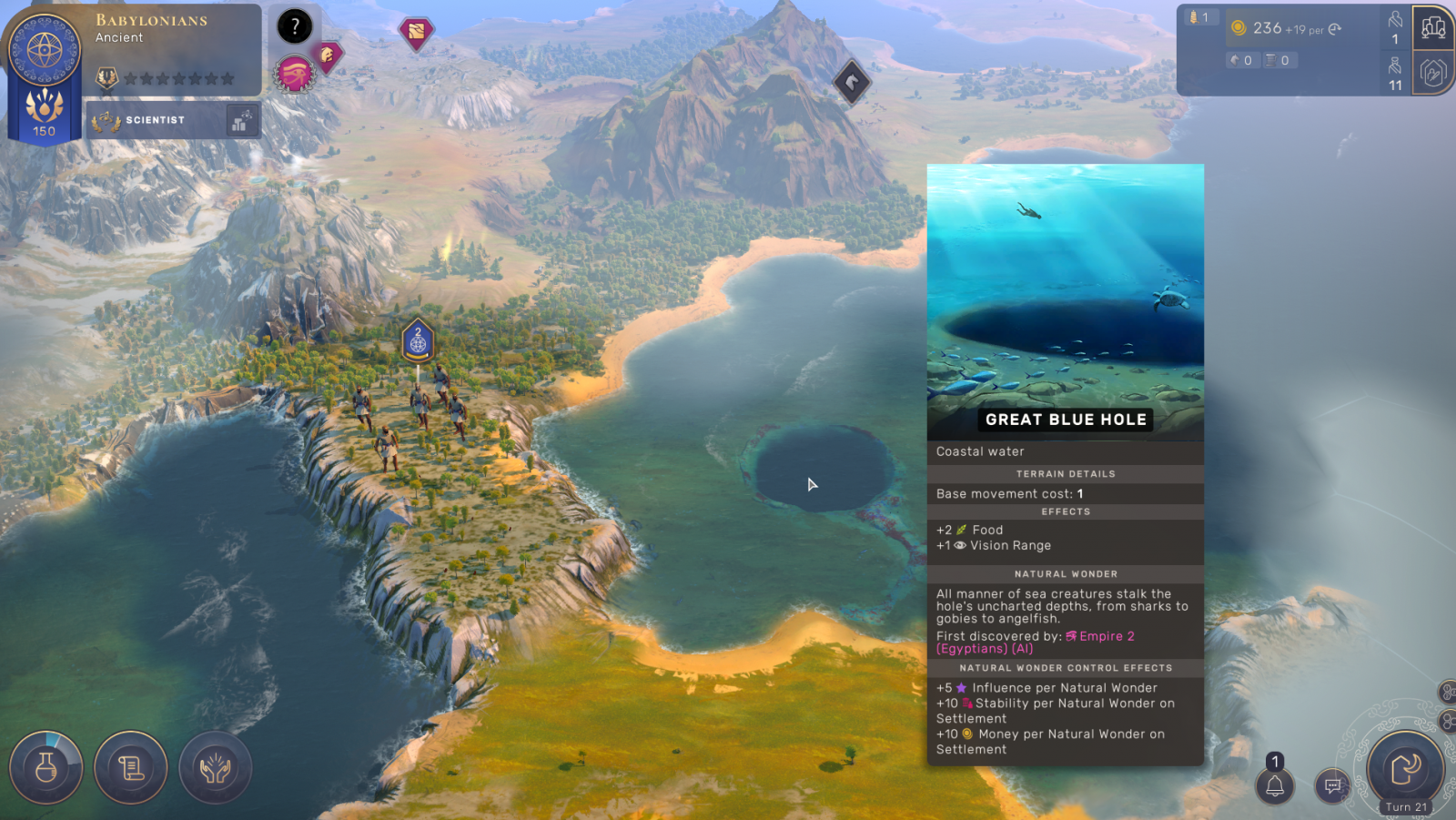
What would you do if you could mold a civilization from a small tribe into an empire that leads the way in science, technology, and power? Have you ever wondered what an ancient civilization would do if they had the technology and knowledge of today? Or if they would still be around, would they rule with an iron fist or extend an olive branch to the world? Well, Sega and Humankind’s developer, Amplitude Studios, invited me to a two-hour hands-on preview of their upcoming civilization-building game Humankind, and it didn’t disappoint.
Humankind is a historical, civilization-building, 4X strategy game that will allow players to choose how they want to rewrite history. Want to take to the skies before the Wright brothers took their first flight? Go ahead. Wish to develop computers to help progress your society’s agricultural growth and education? There’s nothing stopping you. To give some context to the basics of the game: Humankind is about creating your own civilization (or combining it with over 60 others), cultivating it, and choosing how it grows, down to the most minute detail.
During the time of the preview, it was made clear that when the game launches, players will have access to 60 different cultures, spanning 6 eras. Each culture has their own structure, beliefs, and styles, but all these are options and can be modified and changed. Nothing was left on the table as far as customization. Upon the startup of the preview, I was given 4 cultures to choose from: Babylonians, Egyptians, Harappans, and Mycenaeans. To get the best perspective and to experience the many different mechanics and systems, I opted to use my two-hour preview by playing with the Egyptians first and the Mycenaeans last. While each civilization has their own specialty, where the Egyptians are naturally gifted with money, being great planners, and trade, others may begin with a stronger army or scientific studies.
After selecting the Egyptians as my first culture, I dropped into the game world where it’s clear that Amplitude spared no expense in creative development when crafting the terrain and making it feel like more than just a board to play on. My Egyptian army and civilization started with a city that acts as a hub for all items sourced, until I expand my empire. In order to increase my army, I needed resources to build a site for populations of people and industry. By hovering my mouse over the terrain, I was able to see areas where I could harvest food, cut trees for resources, locations for my population to grow cities, and more. To give a sense of the unknown, undiscovered locations are shrouded in a mist to create a sense of realism as to not knowing what’s beyond where you’ve ventured. This is where I learned more about the systems and how they will impact my playstyle and the advancement of my civilization. Now, the game isn’t all about expanding and seeing your empire grow. It’s also about choices that will progress you as a society. One of the choices I had to make was whether I wanted my religion to be spearheaded by women, men, or both. You see, each choice made within the game determines how your society and culture grows. Will they be a close-minded group or a free-thinking society, allowing its people to uplift the community?
The hexagonal grid that the world is built upon is beautifully detailed and complex. The colors that differentiate forests, rivers, mountain ranges, deserts, and more, are blended perfectly to give depth and character to the world. While building, learning, and conquering is the name of the game, exploring and finding hidden locations and natural wonders of the world is a quick way to increase fame and advance your civilization. Don’t think of the terrain as simply a land mass, it plays a great part in resources and even battle. During my second playthrough (which I will go into detail a bit later), I found myself going to battle with the Babylonians, who built their empire on a high ground. In doing so (I should have listened to Obi-wan), I was at a disadvantage because of this and was forced to retreat and rebuild my army.
While there’s a plethora of systems to be aware of while playing, Fame is the name of the game. Fame is how you successfully endure the test of time. It can be earned by expanding your territory, researching new technologies, increasing your army’s strength, increasing your empire’s population, and more. You can also earn Fame by Deeds, which are unique circumstances like locating natural resources or discovering new technologies first. While playing my first playthrough, I chose to explore the world rather than confront neighboring empires. A smart thing to do if your army isn’t up to snuff. You may also befriend them, and in turn they teach you their ways. Finding natural resources, growing my population, and using science as a key strategy allowed me to advance to another area. You must manage your resources (Food, Industry, Science, and Money), your army, industry, and more. While you control your army to explore, acquire resources, etc., you must be aware of your settlements and how they are managing.
My second playthrough with the Mycenaeans was more combative, as I pushed to conquer more locations. Each territory gained is outlined to give you perspective on what land is yours. Whenever encountering wild animals or enemy forces, you’re able to see your strength number which can be used as an indication of your success rate if you choose to go to battle. As the initial inciting party, I attacked first. While sending in your army to attack, some may not make it back alive, but the higher your overall strength number is, the greater chance you’ll have to beat the defending army or send them retreating. While I focused more on exploration, increasing my fame (which for the preview was capped at 600), and warring against other thriving civilizations, I found that managing the systems natural and second nature. It is very much about staying ahead of the curve, as the world is ever changing around you.
As you complete each era (6 in total), you can combine your culture from a list of 10 more that become available. As in real life, you can learn from other cultures by living beside them, conquering them, or assimilating them into yours. There are so many ways to approach playing that there’s no wrong way to play.
To learn more about Humankind, visit Humankind.com. Also, click here to check out Gaming Trend’s interview with Studio Head & Creative Director of Humankind, Romain de Waubert.

